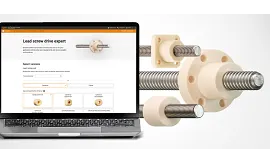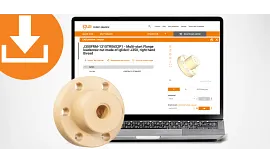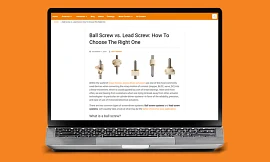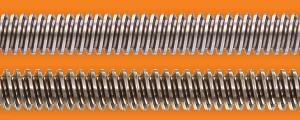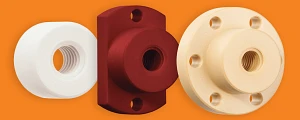Change Language :

Trapezoidal Lead Screws & Nuts
Durable lead screw assemblies that resist wear & eliminate maintenance
Trapezoidal lead screws are characterized by their trapezoidal thread profile, which has a 30-degree angle. This provides a larger contact area than standard threads, enhancing load-bearing capacity and making them particularly suited for heavy-duty applications. Compared to other lead screw types, such as ACME threads, trapezoidal lead screws offer better efficiency and increased resistance to wear, which makes them ideal for applications where both high load-carrying ability and longevity are essential.
Tools & Configurators
Igus offers a range of online tools to help users find the right lead screw system for their application requirements. The various tools available report suitable products based on application parameters and provide service life estimates of the chosen products. Both 2D and 3D CAD models can also be used. Systems can also be individually configured, simplifying the design process. Final configurations can be saved or sent directly to the shopping cart.
Blog: Ball Screw vs. Lead Screw: How to Choose the Right One
Browse Trapezoidal Screws & Nuts
FAQ: Frequently Asked Questions
A: To choose the optimal polymer material, several factors---such as load, RPM, and operating temperatures---must first be considered. iglide® J is the most common igus® material used for lead screw nuts at igus®. It is dry running with zero lubrication required, rated for max temps of 194°F and loads up to 5076 PSI. We also have a variety of materials for more specific application requirements like FDA compliance and resistance to caustic chemical washdowns.
A: igus® has a variety of standard and unique lead screw nut designs. Sleeve, flange, and ACME nuts are just a few of the designs available. igus® also has specialty designs for low clearance and heavy-duty applications.
A: Using the available SLS printing service, custom nuts can be prototyped at a very affordable cost, with lead times of just 2–5 days. Additionally, we can machine parts from our wide selection of polymer bar and plate stock. igus® also has the ability to create custom injection molds for the highest quality possible. Check out our tools and configurators to begin.
A: Oftentimes, lead screws require machined ends to provide a better clamping surface and prevent rotation/slipping. As a result, igus® has an online custom screw designer for all our lead screw geometries.
A: The trapezoid-shaped threads, single starts, and small leads make trapezoidal lead screws perfect for more precise applications that require the screw to self-lock. Functionally, they are the metric equivalent of ACME screws.
A: Most, if not all, trapezoidal lead screws should self-lock. However, a good rule of thumb is to look for screws with a lead of 5mm or less to self-lock. It is important to know that technically, all lead screws have the potential to back-drive under the right circumstances. If self-locking is critical to your application, it is typically recommended to reach out to an igus® expert for support.
Trapezoidal screws have a 30° thread angle and are measured in millimeters, while ACME screws have a 29° thread angle and are measured in inches. Both are otherwise similar in design and function.
A: For optimal performance, it is recommended that lead screws be less than 1,000mm if possible, due to the tendency of the screw to deflect or bend the longer it gets. This deflection can result in loud operating volumes as well as shorter service life.
The diameter of the screw can have a large impact on performance at longer lengths. Lead screws can be effective mechanisms over one meter, however, it is recommended to contact an igus® representative for a free application review/consultation to determine which product will work best.
Browse the Engineer's Toolbox
Contact Us
Questions or product information? Please contact:

Customer Service
Customer Service:
Phone: Monday to Friday from 8 am - 8 pm
LiveChat: 24 hours
Book a Call
Book an Appointment with a Product Expert
